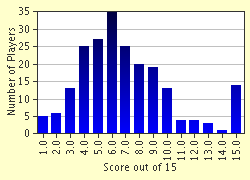Quiz Answer Key and Fun Facts
1. Who is NOT considered an object-relations theorist?
2. Of the following, who is considered an ego psychologist?
3. Which of the following is NOT a characteristic of the MODERN views of psychoanalytic thinking?
4. Via the use of modern psychoanalysis we can deduce that the personality disorder that is characterized by instability, irritability,impulsive anger, and external mood shifts is known as?
5. According to Erikson's psychosocial view, the struggle between industry and inferiority occurs during which stage?
6. Erikson's pre-school age corresponds to which Freudian stage?
7. Which term refers to the repetitions of interpretations and the overcoming of resistance so that patients can resolve neurotic patterns?
8. Analysis of transference is central to psychoanalysis because?
9. Resolution of sexual conflicts and sex-role identity is a crucial task during which Freudian stage?
10. The Electra and Oedipus complexes are typically associated with which Freudian stage of development?
11. Both borderline and narcissistic disorders tend to be rooted in traumatic events during which phase or phases of development?
12. During psychoanalytic treatment, the patient is typically asked what?
13. Which of the following is NOT TRUE of the psychoanalytic process?
14. 'Maintaining the analytic framework' refers to which statement below?
15. In MODERN psychoanalytic therapy (as opposed to classical) which is THE LEAST LIKELY to be used?
Source: Author
zeron7
This quiz was reviewed by FunTrivia editor
crisw before going online.
Any errors found in FunTrivia content are routinely corrected through our feedback system.

